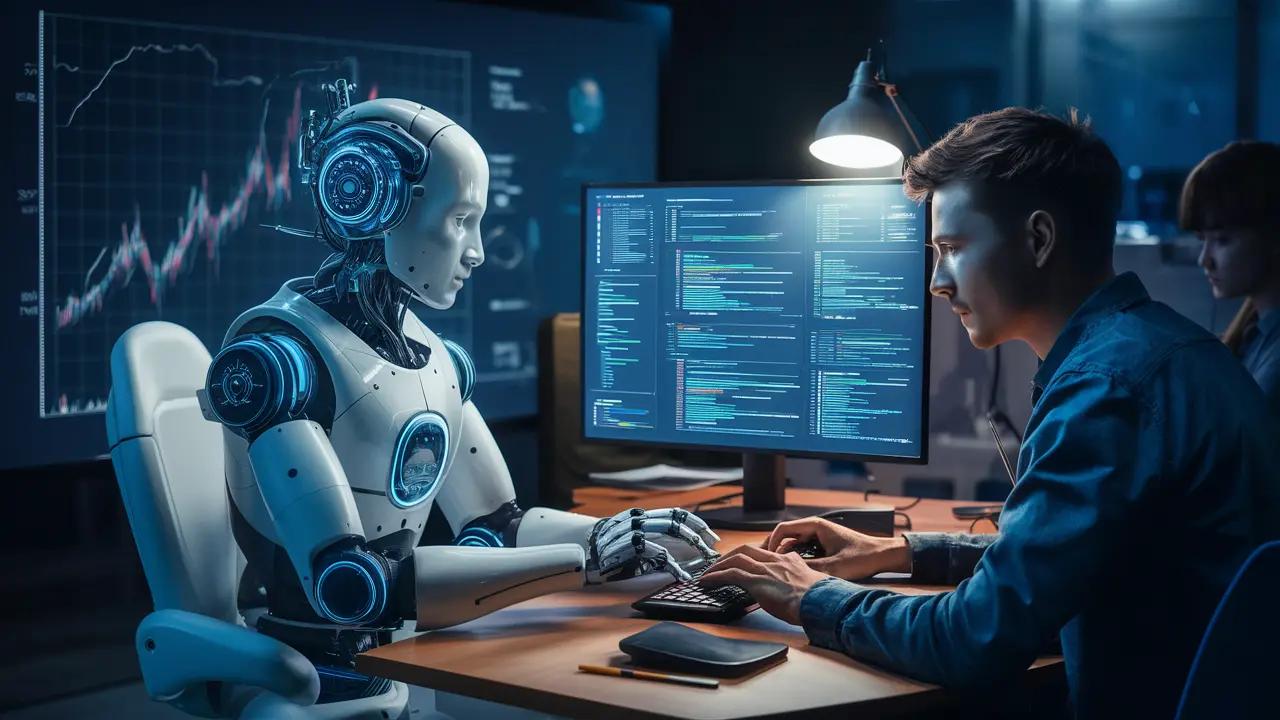August 13, 2023|5 min reading
Artificial Intelligence vs. Human Intelligence | Will AI Replace Humans

From the realm of science fiction into the realm of everyday life, artificial intelligence has made significant strides. Today, AI's pervasive presence across industries and daily activities has ignited a new debate between two competing paradigms: AI and human intelligence. As AI seeks to replicate and perform tasks analogous to human abilities, we find ourselves pondering whether AI can truly stand alone. This article delves into this evolving discourse, exploring AI's potential impact on the future of work and the economy, delving into the distinctions between AI and human intelligence, and considering the ethical dimensions that demand consideration.
1. Navigating the Complex AI-Human Intelligence Nexus: Unveiling Perspectives and Potentials
As artificial intelligence continues to evolve, it has become evident that its overarching goal is to emulate human intelligence in various tasks. However, a fundamental question arises: Can AI truly stand on its own, or is it merely an augmentation of human capabilities? This article delves into the multifaceted landscape of AI and human intelligence, shedding light on the profound impact of AI on the future of work, the economy, and society at large. It explores the critical distinctions between AI and human cognition, addressing the ethical considerations that emerge as AI becomes more integrated into our lives.
2. AI vs. Human Intelligence: A Comprehensive Exploration of Differences and Implications
Artificial intelligence and human intelligence are two distinct realms, each with its unique attributes and limitations. While AI seeks to replicate human-like thinking and decision-making, this comparison reveals the nuanced disparities between these two paradigms. This article delves deep into the essence of AI and human intelligence, dissecting factors like evolution, functionality, learning ability, and choice-making. Through a comparative analysis, it provides insight into how AI can complement and augment human capabilities while raising critical questions about the role of AI in society, the job market, and the ethical considerations that accompany its rapid advancement.
3. The Shifting Landscape of Work and Ethics in the Age of AI: Challenges and Considerations
The advent of AI has reshaped the landscape of work and ethics, prompting a reconsideration of traditional norms. As AI's influence expands, it brings both opportunities and challenges for the job market and society as a whole. This article delves into the transformative impact of AI on the future of jobs, discussing automation, the emergence of new opportunities, and its potential role in driving economic growth. Moreover, it contemplates the changing nature of work in an AI-driven world, highlighting the importance of meaningful employment, human collaboration, and the ethical implications of integrating AI into various aspects of our lives.
4. Future of Jobs in the AI Era: Automation, Collaboration, and Unleashing Human Potential
The rise of AI has spurred discussions about the future of jobs and the intricate interplay between automation and human involvement. This article delves into the evolving nature of work in the AI era, showcasing the automation of tasks and the subsequent emergence of new opportunities. It explores the potential economic growth catalyzed by AI, emphasizing its role in enhancing productivity and shaping industries. Beyond automation, the article envisions a collaborative future where AI augments human capabilities, allowing individuals to focus on creativity, innovation, and higher-order tasks. It underscores the symbiotic relationship between AI and human intelligence, advocating for a view where AI acts as a catalyst for unlocking human potential rather than displacing it.
In the journey from science fiction to reality, artificial intelligence has marked its territory. Its integration into industries and daily life has sparked a thought-provoking dialogue about its role alongside human intelligence. While AI's goal is to mimic human capabilities, the extent of its adequacy remains a topic of inquiry. This discourse envelops a wide spectrum, from the potential implications for the workforce and economy to the intricate disparities between AI and human intelligence. Amid this debate, ethical considerations beckon for attention, raising questions about AI's responsibilities and its alignment with human values. As AI advances, it's our responsibility to navigate its evolution thoughtfully, harnessing its potential while safeguarding the essence of human ingenuity and compassion.
Explore more

Unlocking the Mind: How AI Reconstructs Thoughts with Medical Imaging
Discover how combining medical imaging and diffusion models can reconstruct images of thoughts. Explore the fascinating ...

NVIDIA: Leading the AI Revolution
Discover how NVIDIA is pioneering the AI revolution, transforming industries with advanced GPU technology and ethical AI...

Will AI Replace Programmers and Software Engineers? Future of Coding Jobs
Discover if AI could replace programmers and software engineers. Explore the impact, benefits, limitations of AI in pro...
